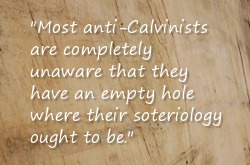How serious a threat do you think hyper-calvinism is to evangelism? (hyper= constant emphasis)
Poll Results
How serious a threat do you think hyper-calvinism is to evangelism? (hyper= constant emphasis)
Discussion
Answering the 95 Theses Against Dispensationalism, Part 13
 Republished with permission from Dr. Reluctant. In this series, Dr. Henebury responds to a collection of criticisms of dispensationalism entitled “95 Theses against Dispensationalism” written by a group called “The Nicene Council.” Read the series so far.
Republished with permission from Dr. Reluctant. In this series, Dr. Henebury responds to a collection of criticisms of dispensationalism entitled “95 Theses against Dispensationalism” written by a group called “The Nicene Council.” Read the series so far.
Thesis 57
Despite the dispensationalists’ claim that Christ could return at any minute because “there is no teaching of any intervening event” (John Walvoord), many of their leading spokesmen hold that the seven churches in Rev 2-3 “outline the present age in reference to the program in the church,” including “the Reformation” and our own age (J. D. Pentecost).
Response: It is true that some dispensationalists have regarded the seven churches as a kind of prophetic outline of church history. But not all have, and it is a mistake to think it is necessary to the dispensational system. Robert Thomas has a lengthy excursus on this teaching in the first volume of his Commentary on Revelation in which he rejects it. This view reflects an unhealthy admixture of speculative historicism to the futurism implicit in dispensational premillennialism.
Still, those who advocate the historical-prophetic view of Revelation 2-3 are careful to say that the churches are types of the visible church in every age, with one type predominating at one particular time. Thus, the prophetic portion is more in the way of application than strict hermeneutics.
As one who holds that it is often precarious to teach doctrine from types I would be glad to see this approach abandoned.
Discussion
Wanted: More Arminians
 It has become a bit routine:
It has become a bit routine:
- Email arrives from someone assuming I am (or everybody at SharperIron is) a Calvinist.
- Email poses question believed to be incriminating of Calvinists or unanswerable by them.
- Response from me offers biblical answer that is not especially calvinistic.
- Questioner ignores most of the particulars, broadly condemns “Calvinism.”
- Discussion becomes repetitive, overly heated or both, ends.
A recent example appears below, with details removed to avoid identifying the sender. I’m including the exchange because, this time around, a reality hit home to me that hadn’t before: apparently, many fundamentalists think that anti-Calvinism is a complete doctrine of salvation.
But anti-Calvinism is, at best, a thoughtful rejection of one particular doctrine of salvation. More commonly, it’s nothing more than a feeling of hostility toward doctrines only partially understood. As a result, many anti-Calvinists have no coherent doctrine of salvation at all. They have rejected lasagna from the menu but have walked away without ordering any alternative.
Discussion
Early Christian Decision-Making: Where Do We Start?
 Also in this series: Part 1, Part 2.
Also in this series: Part 1, Part 2.
Pick up a book or a magazine article on the subject of church government and most likely you will read a discussion beginning with pastors, elders, ordination, or authority. Others go directly to instances of church order in the New Testament. Since graduating from seminary, my view on where to begin the subject has changed, step by step. Why is it that when we really want to understand the nature of something in Christ’s church we do not first look at Christ Himself and His church? If “a picture is worth a thousand words,” then why can’t we look at pictures of Christ and His church in the New Testament and begin to get our answers? And why can’t we first ask what Jesus said?1 As we read the New Testament and begin to reflect, we will understand that we have a few volumes’ worth of ideas to tell us how the church should govern itself, including the one small element I have chosen to write about: early Christian decision-making. I will focus on two of those ideas.
1. Authority and equality
Christians are followers of Jesus the Messiah. From the very first days of the Jesus movement until today, Jesus is known as the head (kephale) of the church (Eph. 4:15, 5:23, Col. 1:18) and the Lord (kyrios) of His followers (Matt. 8:23; Luke 11:1; Acts 1:21, 5:14, 15:11; Rom. 1:3; 1 Cor. 1:2; etc.). The authority of Jesus in the church is regal, absolute, and unquestioned. And to a certain extent, His authority limits creativity in church government.
Discussion
The Rapture of the Church, Parts 4 & 5
 Read Part 1, Part 2, and Part 3.
Read Part 1, Part 2, and Part 3.
The Glorification of Dead Christians
The most detailed description of the rapture of the church is found in Paul’s first letter to the persecuted Christians whom he left in Thessalonica. He wrote this letter from Corinth, where he confronted much confusion about the personal destiny of believers. Some Christians in Thessalonica had already died (perhaps by martyrdom), and the saints there were concerned that their dead loved ones would miss out on the second coming of Christ.
But dead Christians will not be forgotten by God at the second coming. In fact, they will be the first humans to experience glorification since the Lord Jesus. Yes, Christ was “the firstfruits.” He is the first and only human ever to have been glorified. But “afterward”—nearly 2,000 years already—members of His body and bride, namely, “those who are Christ’s,” will share His glory “at His coming” (NKJV, 1 Cor. 15:23).
Now Paul was emphatic in his letter to the believers in Thessalonica on this one point: Dead Christians will be glorified even before living Christians!
Discussion
The sin of Gluttony
Discussion
When did the Holy Spirit first indwell God's people?
Poll Results
When did the Holy Spirit first indwell God’s people?
God’s people have always been indwelled by the Holy Spirit (i.e., Old Testament Saints). Votes: 0
The disciples first received the indwelling of the Holy Spirit at the beginning of Jesus’ earthly ministry. Votes: 0
The disciples first received the indwelling of the Holy Spirit at Pentecost. Votes: 0
Other. Please explain. Votes: 2
Discussion
Is this immoral?
They decide how much they will give you on your (or if you’re under 24, you and your parent’s) income.
The problem is that my father declares no income, even though I know he has one. I wouldn’t be responsible, he lied to me about his income, etc.
Regardless, I know it’s not true and I don’t know how much, if any, I would get if I had his true income.
Discussion
The Terrible, Swift Sword

One moment they said, “peace and safety,” but then came sudden destruction like a thief in the night. For Osama bin Laden and his entourage, calamity struck in the form of American helicopters and US Navy Seals. After a few moments of frenetic terror, bin Laden was dispatched into eternity.
The world has not mourned his slaying. Quite the opposite. When news of his death broke, crowds gathered spontaneously, breaking into impromptu celebration and song. A Philadelphia baseball game came to a halt as fans, and then players, burst into cheers and chants.
Why such jubilation? Why celebrate a human death? It would be easy to dismiss this elation—and some have—as a coarse expression of American triumphalism, as if America were the studio audience and bin Laden were an especially unpopular guest on the Jerry Springer show. A few Christian pundits have worried whether such jubilation is compatible with Christian love and the desire for reconciliation.
Those who experience such concerns should spend a few hours pondering the ferocity of Psalm 137 or reflecting upon the taunt against the king of Babylon in Ezekiel 28. They might even consider the ground of the encouragement that Paul offers in 2 Thessalonians 1:8-9. The sensibilities of these and similar Scriptures cannot be confined to some different dispensation. What they express is a legitimate aspect of the life of faith, and we deny or suppress these expressions to our detriment.
Discussion